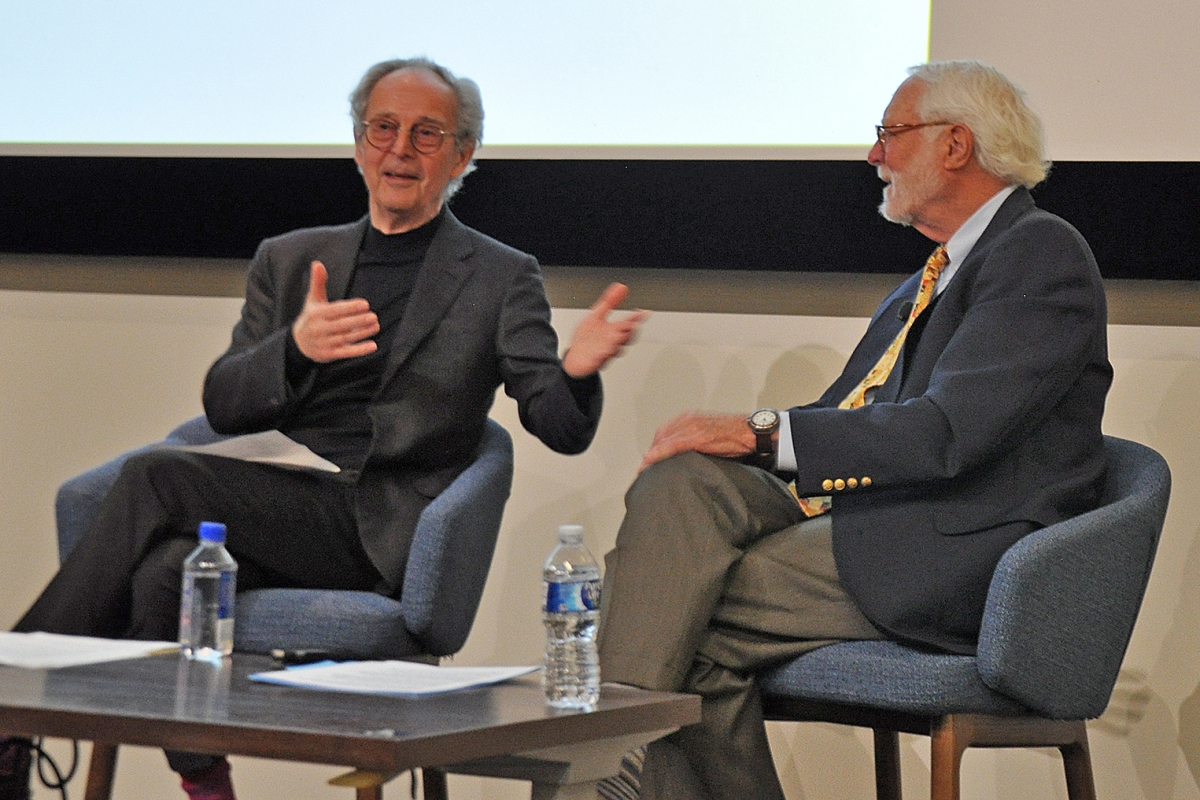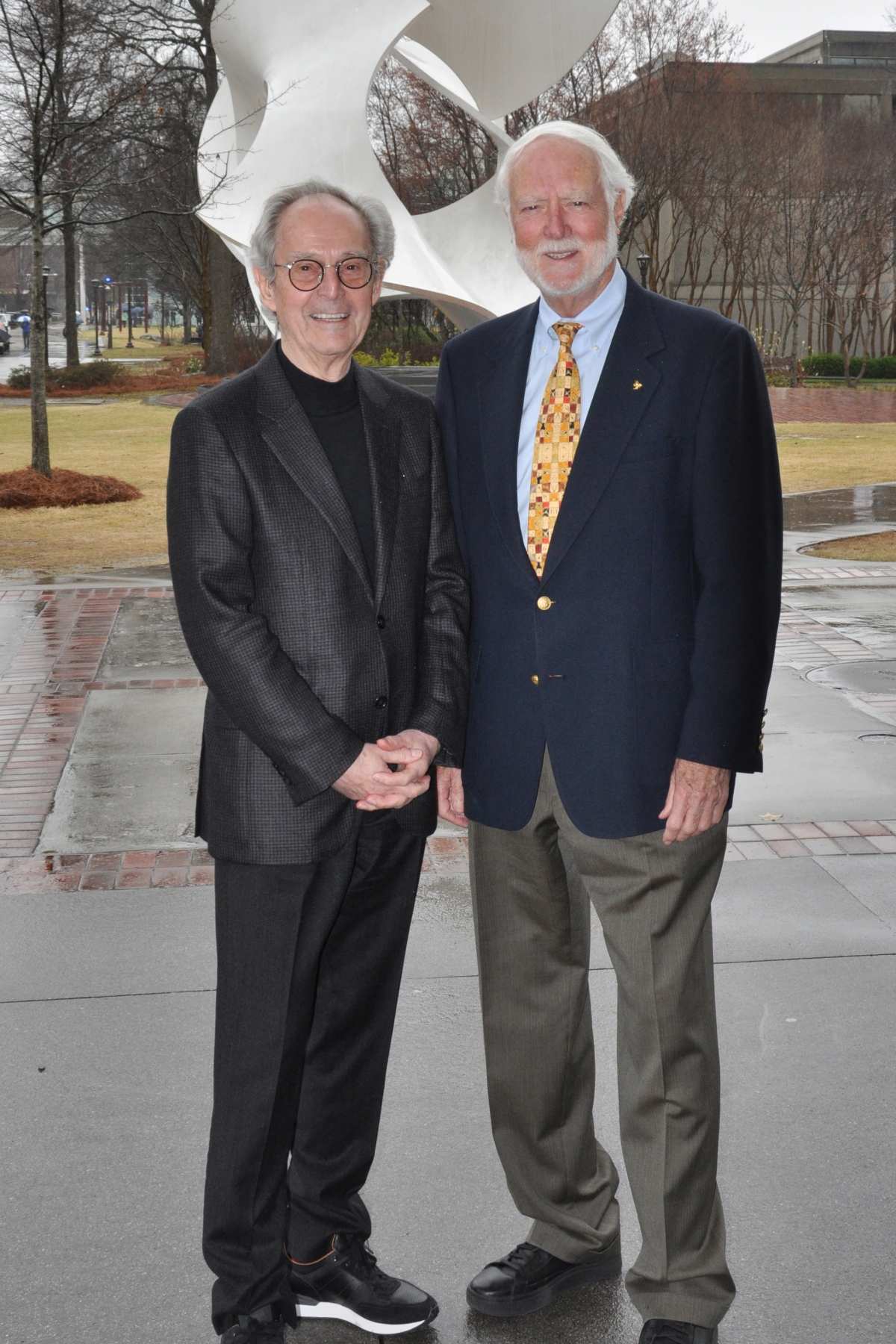Throughout his career, Jean-Lou Chameau has left a positive impact at top universities around the world with his unique brand of engineering leadership.
Chameau returned to Georgia Tech on March 5 for the Spring 2024 Hyatt Lecture to share stories from his life in Leadership. Chameau arrived at Tech in 1991 to serve as chair of the School of Civil and Environmental Engineering and went on to become Provost of the Institute.
After leaving Tech, Chameau became president of the California Institute of Technology. He was later recruited to become the president of King Abdullah University of Science and Technology in Saudi Arabia.
For the first time since the Hyatt Distinguished Leadership Lecture Series was established in 2015, the lecture was delivered in the form of a fireside chat.

Jean Lou-Chameau, left, and G. Wayne Clough in conversation during the Hyatt Distinguished Leadership Speaker Series on March 5, 2024.
Chameau was joined by Georgia Tech President Emeritus G. Wayne Clough, who asked him a series of insightful questions about his life. They share a special connection dating back to the beginning of their careers: Clough was Chameau’s Ph.D. advisor as a young faculty member at Stanford University.
The theme of Chameau’s lecture was leadership from the ground up, emphasizing his humble background and dedication to serving others.
Early Life
Chameau’s journey to civil engineering began in his native France, where he was the first in his family to go to college. He credits his grandmother for providing a strong foundation in life and instilling in him the values of humility, respect, and hard work.
While working toward his engineering degree in France, He met a visiting scholar from the U.S. with a Ph.D. in engineering. Intrigued by the possibility of earning a graduate degree abroad, he began researching and applying to engineering programs in America. He was accepted to Stanford, which caught his eye not only for its academics but its proximity to the culture-capital of San Francisco.
“It was the time of the mid-70s, it was still the time of the hippies and San Francisco was the place to go,” Chameau said.
Though he didn’t care for his geotechnical engineering course in France, Chameau decided to give it another shot at Stanford. He enrolled in a class taught by Clough that completely changed his view. Chameau loved the subject and went on to work with Clough as his PhD advisor.
“Having a student like Jean-Lou was really a pleasure,” Clough said. “My job was really not to do anything to hold him back.”
Entering Academia
After earning his PhD, Chameau was hired to join the faculty at Purdue University. It wasn’t long before he was offered his first leadership position.
Chameau worked with seven other faculty members in the geosystems engineering group. They were all accomplished scholars individually, but they didn’t get along well and argued often.
Shortly after being promoted to associate professor, Chameau was asked by his department chair to lead the geotechnical group.
“You seem to be the only one they are able to talk to and work with,” he recalled his department chair telling him.
Chameau found that he really enjoyed his newfound role leading and supporting his colleagues, rather than focusing only on his own success.
He told students to pursue leadership if they find it fulfilling.
“You will have opportunities to be in a leadership position. But something I really encourage you to pay attention to: Do it if you really feel rewarded by it in terms of serving, because you will be serving those people,” Chameau said. “You have to be willing to serve and care about people and make it your priority compared to your own priorities.”
“You have to be willing to serve and care about people and make it your priority compared to your own priorities.”
Jean-Lou Chameau
Georgia Tech
When Chameau arrived at Georgia Tech, it was not yet a nationally ranked civil engineering program. But Chameau recognized the potential within the School. There were many young faculty members with great ideas, but they didn’t have the resources or institutional support to accomplish them.
Chameau told the faculty he wanted to support their ideas and figure out how to make them happen.
“Empower people and give them confidence and they will do great things,” Chameau said.
Chameau briefly left academia to work in private industry. When Clough became president of Georgia Tech, he invited Chameau to join his leadership team.
“I wanted to create a whole new way of looking at research and graduate studies. I knew I needed somebody who had an innovative outlook on life,” Clough said. “He came back and made a huge difference in my administration.”
Chameau recalled the excitement of working with the team Clough assembled at the start of his tenure as president.
“The team to me is the most important thing you do as a leader initially,” Chameau said. “There was a great team of people who really felt we have a great opportunity to transform this place into one of the best in the world under the leadership of Wayne and his vision.”

Jean-Lou Chameau, left, and G. Wayne Clough, right, at the Hyatt Distinguishd Leadership Speaker Series on March 5, 2024.
Caltech and KAUST
In 2006, Chameau moved across the country to become president of Caltech.
Not long into his tenure, Chameau faced the challenges of the Great Recession. It was a difficult time to be in a position of institutional leadership and Chameau had to make tough decisions, implementing budget cuts while keeping an eye on the future.
“We were the only university in California, and maybe the U.S., that kept hiring during that time,” Chameau said.
He urged students to be prepared for both the good and the bad times that they may experience as a leader.
After serving as president of Caltech for seven years, Chameau received an opportunity to move abroad and lead a new university in Saudi Arabia called King Abdullah University of Science and Technology (KAUST). The university, established in 2009, allowed men and women to study together for the first time in the nation’s history.
Chameau was enjoying his work at Caltech, and was planning to stay in his role for 2-3 more years before considering a move.
“I don’t believe you should be in a leadership position for too long,” Chameau said.
Though it came earlier than he was expecting, Chameau was drawn to the opportunity.
“It was hard to say no when you realize you can do something that is very important for a particular country, but a country also that is important to the world, and to a society where you can be a wedge for change,” Chameau said.
He said despite his many successes, the work of a leader is difficult.
“There are many times where it’s hard and times where you feel it’s impossible. There were times I didn’t sleep at night,” Chameau said. “Remain focused on what your role is and always think about ultimately what counts is the people in front of you.”
